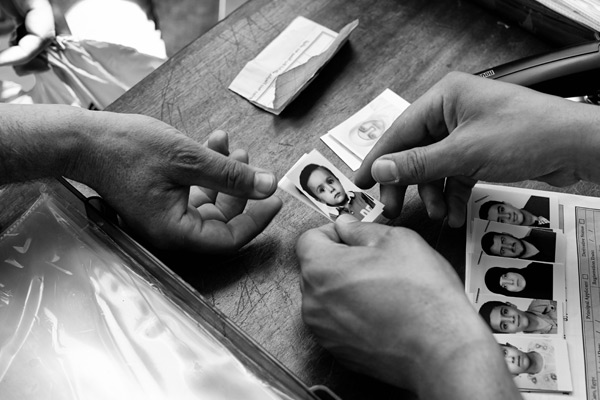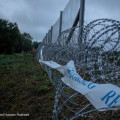Legal Entry Channels for asylum seekers to be boosted according to FRA Report

A representative from UNHCR receives a passport photograph as hundreds of Syrian refugees register for protection and other social services at UNHCR offices in the Zamalek neighborhood in Cairo, Egypt. Credit: UNHCR/S. Baldwin
The deaths of migrants crossing the Mediterranean Sea have reached record numbers in 2014, topping 3.000 casualties during the year. In order to address this calamitous situation, the European Union Agency for Fundamental Rights (FRA) has recently issued an easy-to-read toolbox dealing with the need to find new institutional and legal instruments, and boost those already existing, in order to allow people in need of international protection to reach the EU borders through legal and safe avenues.
The FRA’s suggestions which will be further summarized firmly aim to encourage the EU Institutions and the Member States to deliver new policies to stop the appalling loss of lives and criminal actions that the Mediterranean Sea has been witnessing over the last three years.
The paper lists a set of refugee-related schemes that could be considered as viable solutions to open new ways of legal entry for people seeking refuge in Europe. These are the main recommendations:
– The Resettlement of refugees with the UNHCR should be extended as a practice to all the Member States, since only half of them take part nowadays in resettlement programs. A call to work on a new potential common European Resettlement program should be made with a view to establishing a working, legal and durable solution for refugees.
– Humanitarian admissions should be considered as another way of letting refugees enter Europe legally. The FRA’s definition of Humanitarian Admission is one that very much resembles resettlement but it is, in fact, subsidiary to it, since persons who do not qualify for resettlement could gain Humanitarian Admission, like, for example, internally displaced people.
– A strong call is made by the FRA to recast the European Visa Code in order to facilitate the issuing of Visas on Humanitarian Ground. By removing the many obstacles caused by the Schengen area’s rules and by increasing the presence of the EU representation in Third Countries, many people in need of international protection might safely reach Europe.
– The implementation of the Temporary Protection Directive (2001/55/EC) may be an easy solution for emergency cases, such as the current Syrian circumstances. Although the directive has never been used since it entered into force, lifting all Visa requirements altogether might represent a truly effective tool to provide fast refuge to the Syrian people fleeing the civil war.
Secondly, the FRA suggests other possibilities of action, such as regular mobility schemes to be given for international protection:
– Through Family Reunification many asylum seekers could join their relatives who are already based in Europe and enjoy the effect of being integrated into the new Country within a familiar network.
– Thanks to Labor and Students’ Mobility the EU could welcome and shelter persons in need of international protection and, at the same time, satisfy its needs in terms of labor force, educational development and research.
– As a last option, Medical Evacuation would allow those asylum seekers who suffer from temporary or chronic illnesses and diseases to be transferred to a European Country were they could find protection and proper medical help.
We will probably have to wait for some time before being able to assess whether the European Institutions will truly take the FRA’s suggestions into account or will just let them fall into the wide pool of smart, ignored recommendations.




